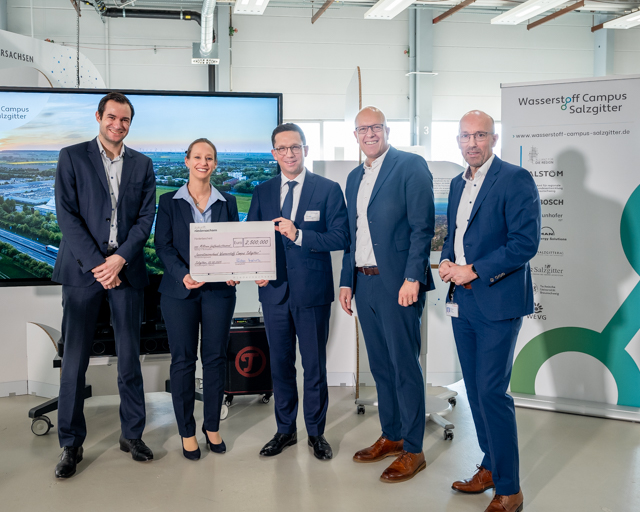The funds from the “zukunft.niedersachsen” program will be used to implement the “Wasserstoff Campus Salzgitter Innovation Network”, which is being driven forward under the scientific leadership of the Fraunhofer IST in close cooperation with the TU Braunschweig. “The planned research work takes up the program goals of the ‘Mission Hydrogen 2030’ from the 8th Energy Research Programme of the German Federal Ministry for Economic Affairs and Climate Action (BMWK) and is oriented towards the national and Northern German hydrogen strategy,” explained Prof. Dr.-Ing. Christoph Herrmann, Institute Director of the Fraunhofer IST and Chairman of the Board of the Wasserstoff Campus Salzgitter e.V.
“One particular focus of the planned work is on the further development of innovative hydrogen technologies and their production processes as well as on the elaboration of digital simulation models for holistic value chains in the hydrogen economy of the future,” added Prof. Dr.-Ing Sabrina Zellmer, Deputy Director of the Institute and spokesperson for the joint project. “We will use the acquired knowledge to further develop transfer projects and to implement the results in teaching and learning opportunities.”
The entire value chain should thereby be covered, including the establishment of hydrogen supply chains, the decarbonization of industry and neighborhoods, the flexible production of components for fuel cells and electrolyzers, and fuel-cell mobility. The Wasserstoff Campus Salzgitter functions hereby as a real laboratory that allows close networking between researchers and users. Michael Gensicke, CFO of the Wasserstoff Campus Salzgitter e.V. and Managing Director of Robert Bosch Elektronik GmbH, emphasized: “Through the trusting exchange with various players from research and development, politics and business, the Campus constitutes an important innovation platform for the participating companies, which is unique in its form.”
“The Wasserstoff Campus Salzgitter exemplifies the progress that we can achieve through regional cooperation. The challenges of the energy transition can only be mastered locally. Our goal is to convert the transformation into real added value for the region,” confirmed Matthias Wunderling-Weilbier, State Secretary in Lower Saxony’s Ministry for Regional Development, referring in this context to the accomplishments of the Amt für regionale Landesentwicklung Braunschweig (Braunschweig regional development office) under the leadership of Dr. Ulrike Witt. Mr. Wunderling-Weilbier is Chairman of the Advisory Board for the Wasserstoff Campus, which convened for the first time today.
“Our Wasserstoff Campus is a flagship project with major appeal,” enthused Mayor Frank Klingebiel: “With the Wasserstoff Campus, situated at Lower Saxony’s third-largest industrial location, we are taking a significant step towards a sustainable future. New training and further-education opportunities are being created here and, as a result, a good basis for future-proof jobs in the hydrogen economy. This is a substantial gain for our city and the entire region.”



